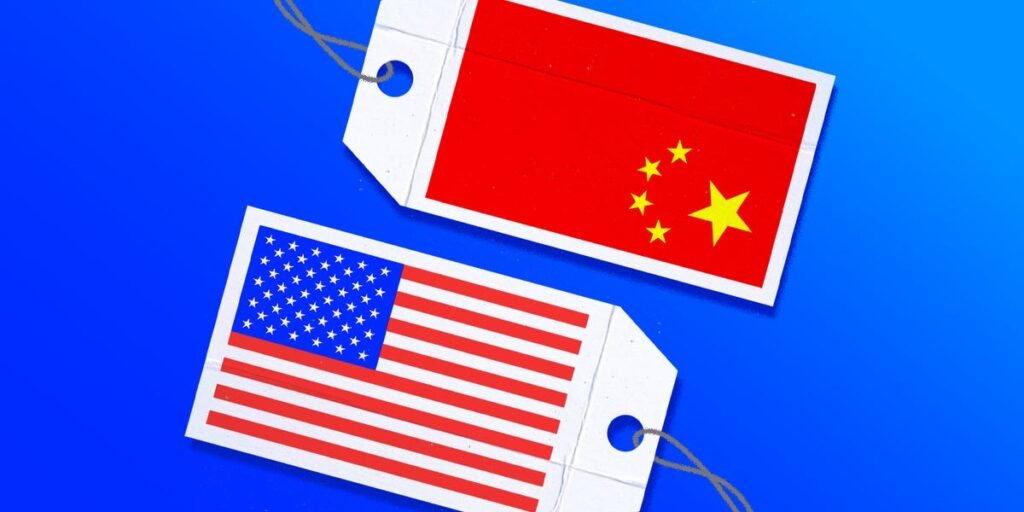As President Donald Trump’s new trade tariffs take effect, business owners are scrutinizing every item in their catalogue and scouring obscure import codes for savings.
For viral beach tote maker Bogg, the stakes became painfully clear when CEO Kim Vaccarella’s team reviewed a small keychain. They saw that a zinc alloy key ring was incorrectly classified as stainless steel under the Harmonized Tariff Schedule, or HTS.
That caused duty rates to be 30% higher than expected, Vaccarella told Business Insider.
“As if the tariffs weren’t bad enough, getting charged incorrectly adds to the mayhem,” she said.
Bogg Bag
The HTS is essentially the government’s master list of about 20,000 product codes.
Before Trump’s tariff hike, most goods fell between zero and 7%, keeping the US average at about 1.4%, said Scott Maberry, a Washington-based trade lawyer at Sheppard Mullin. Now, with a 10% baseline tariff layered on top of country- and product-specific duties, the average rate has surged closer to 18%.
That means even small oversights in classification can result in big costs for importers like New Jersey-based Bogg.
“It wasn’t even like we picked this particular material for aesthetic purposes or anything like that — it’s just what we sampled out and were using. So we did have to go back to the drawing board on that one to be able to bring that product back,” she said.
Bogg is now reclassifying the part as zinc alloy, which comes with a lower tariff rate than stainless steel.
Bogg
Businesses are turning to ‘tariff engineering’
To cope, some businesses are turning to tariff engineering — a well-established and legal move to qualify for a lower duty code by tweaking materials, product design, or the way an item is used.
Emil Stefanutti, the CEO of trade-tech startup Gaia Dynamics, said one client shifted a beanie’s material blend from 50% wool to just over 50%, moving it into a different tariff category.
“Somebody would say, ‘Let’s just change the composition of our material so that it has more wool in it, so that we can classify it with this HTS code as opposed to the previous one we were using, and now we’re saving 4.2% on every beanie we sell,'” Stefanutti said.
Vinny Licata, the head of logistics and import compliance at Fictiv, a digital manufacturing platform, said classification can also hinge on how a product is used.
“A motor goes into a medical device versus a motor that may go into a car — you could just optimize the way you put it in the correct category,” said Licata.
Even the biggest retailers are paying attention.
On Walmart’s May earnings call, CEO Doug McMillon said suppliers were “shifting materials from tariff-impacted components like aluminum to fiberglass, where there is no tariff.”
“Our merchants, sourcing team, and suppliers are being creative,” McMillon said.
The costs of getting it wrong
With more than 20,000 classifications for everything from shoes to circuit boards, mistakes are common — and costly.
“It’s like getting your own taxes wrong,” said Stefanutti. “If you misdeclare taxes in most countries, you’ll be in trouble, potentially.”
The same applies to HTS codes.
Getting HTS classification wrong can mean the difference between paying a modest duty or getting hit with a massive surcharge.
It can also lead to fines, seizures, and reputational damage if Customs decides an importer crossed the line.
Penalties escalate quickly: A simple mistake might cost the importer based on the duties owed or a portion of the goods’ value, gross negligence increases the hit, and fraud can cost you up to the full value of the shipment.
In March 2024, Ford agreed to pay $365 million after authorities found it misclassified vans to dodge a 25% tariff — one of the largest customs penalties in recent history.
The costs of getting it wrong
Importers are scrutinizing HTS codes not just to lower tariffs but to keep up with enforcement.
According to a May memo from the Department of Justice’s Criminal Division, trade and customs fraud is now a top enforcement priority.
Maberry’s law firm has received 35% more client queries about HTS classification and reclassifications in an average month than before the 2024 election, he said.
At Gaia Dynamics, requests for audits are surging and now make up about 40% of the business.
In the past, projects were more routine and involved classifying new items being imported, said Stefanutti, Gaia Dynamics’ CEO.
“Now, companies are saying, ‘We need to classify everything in our inventory, right away, to make sure everything is correct,'” he said.
At Fictiv, Licata said customers are increasingly demanding visibility into how classification and tariffs affect costs.
Rather than focus narrowly on tariff percentages, Licata pushes clients to calculate the all-in cost of getting a product from the seller’s door to its final destination.
His advice to importers still recalculating costs under Trump’s tariffs is blunt. “Even if you bring it to the US, you will just have a higher labor rate,” Licata said.
With “just no way to avoid a higher cost,” Licata advises businesses to better manage their costs.
Bogg had relied exclusively on Chinese factories for more than a decade. Tariffs led the company to diversify its supply chain.
The bag maker has shifted 30% of its production from China to Vietnam and aims to move 50% of its production outside China by early next year.
The company generated $100 million in revenue last year and aimed for $170 million in 2025, but tariffs and supply chain disruptions have put that target out of reach, said Vaccarella, the CEO.
Despite the strain, Vaccarella has resisted passing costs on. Her original bag model costs $90.
Instead, like many importers, she’s finding that the difference between protecting her margins and losing them can be as small as a few digits in the HTS code.
“Now we’re hyper-focused on paying attention to what we’re using to make sure that we’re not getting killed in tariffs on a particular product,” Vaccarella said.

